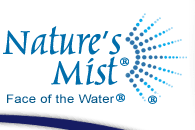
     
A decade of research has revealed the most effective, safe, and natural way to soothe dry irritated skin...
Dry Air
Factors Affecting Humidity
Humidity
Humidity refers to water in gas form, or water vapor in the atmosphere (quantity of moisture in the air). Humidity does not refer to liquid droplets of clouds, fog or rain, therefore, it does not constitute "wetness" since it is dry like all other gases. Air doesn't actually "hold" water vapor, but instead "coexists" with water vapor. Relative humidity (often referred to) is defined as the percentage of moisture in the air relative to the moisture capacity of the air. When humidity is relatively high, evaporation (water loss) processes are slowed because the air is already saturated with moisture.
Dry Air and Indoor Climate Control
Dry air is defined as air lacking water vapor (of course there is always a minute quantity of moisture, but here it is not significant enough for measure). Two factors contribute to dry air indoors: air conditioning and central heating (together known as HVAC or "climate control"). Heating, ventilation and air conditioning are interrelated as the temperature and humidity of air within a building are artificially controlled. Air conditioning is the process through which air is cooled, cleaned and dehumidified (moisture removed) before entering a room.
The Importance of Hydrotherapy!
Since we live in an age where indoor heating and cooling have become a necessity (buildings, cars), we must address dry air issues and its effect on the human body. When moisture is low in the surrounding atmosphere (indoors or outside), skin evaporation increases. This results in transepidermal water loss or "TEWL" (movement of moisture up through the deep dermal layer to the stratum corneum).
Breathing dry air is a potential health hazard because it dries out respiratory passages that require moisture (mucous membranes assist in moistening these delicate passages). Resulting respiratory ailments could include nosebleeds, sinusitis, asthma, bronchitis and overall general dehydration. Additionally, skin moisture evaporation (either through transepidermal water loss or perspiration) can cause a multitude of skin irritations as well as eye itching. To relieve the effects of dry air, moisture must be added to the surrounding atmosphere in order for our bodies to absorb and replenish what was lost.
Hydrotherapy in a bottle - Nature's Mist® Face of the Water™ is an all natural tissue-culture grade water, providing just the right amount of moisture to dry, irritated skin.
|






